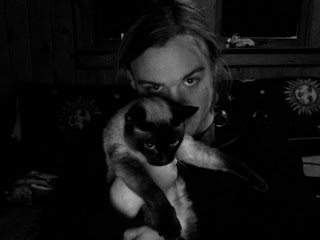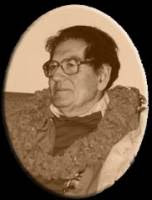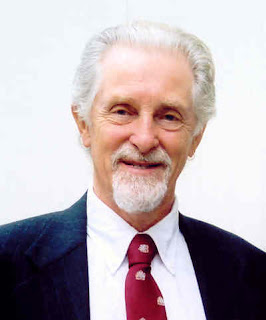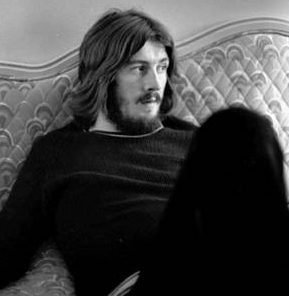(This is an old piece, and is basically excerpts from a workshop I do on the topic. In honor of
Led Zeppelin IV's fortieth anniversary I thought it was worth putting on DPT. I'm sure there are all sorts of typos in it, I had to rescue it from from the depths of my hard-drive, but I was in a hurry to put it up. There's also an article on my website panmankey.com about Led Zeppelin and Tarot which you can access by clicking
here. Happy 40th
Stairway!! For musings on the greatness of Zep's fourth album click
here.)
Led Zeppelin and the Occult
I’ve always loved rock and roll, but I never thought I’d get
involved with it in any tangible way.
A few years ago I was kicking around ideas for summer workshops and came
up with the idea that something on Led Zeppelin and the occult might be fun,
for me. I never thought anyone
else would care about it. A few
months later I’m at the Starwood festival with almost 100 people under a tiny
little canopy, cranking up the Zeppelin and talking about Aleister
Crowely. It was amazing. Couple the Zeppelin talks with Morrison
Rituals, and all of a sudden I’ve cornered the market on Pagan rock and roll
presentations.
This whole Led Zeppelin and the Occult thing is really
important to me because the Zep was my gateway into Paganism. Jimmy Page's fascination with Aleister
Crowley led me to want to know more about Crowley, and forced me to get over
the stereotype that anyone who is not a Christian is a Satanist. Robert Plant's interest in Celtic
Mythology opened the door into the world of modern Witchcraft, the ancient
Druids, and a whole mess of bad Llewellyn books. Led Zeppelin laid the groundwork for my walk with the
Goddess and God, and I have a feeling that I'm not alone. The response I get when talking about
Zeppelin is confirmation of that, as is you reading this!
I was 17 when I got serious about listening to Led
Zeppelin. The year was 1990 and
Atlantic Records had just released the four disc “Led Zeppelin Boxset” that
fall. As a heavy metal fan I knew
that I had to have it, but I didn't really know why. Of course I was familiar with Led Zeppelin, who hasn't heard
“Rock'n'Roll” “Black Dog” “Whole Lotta Love,” and of course “Stairway to
Heaven?,” but the Zeppelin catalog is so much deeper than what classic rock
radio would have you believe.
Over
the next few months I lost myself in the Zeppelin, by May of that year I had
become a fanatic.
For a period of time in college I tried to convince my
friends that my nickname should be “Led,” that's how bad (or sick) my Zeppelin
jones was (anyone catch that pun?), oh who am I kidding, is. As I've grown older I've found new
things to appreciate about the band, and because modern rock music basically
blows serious chunks, Zeppelin has become popular again, almost hip. So popular in fact that Zeppelin
clothes are easier to find now than they were ten years ago.
The pseudo-goth-punk rock mall chain Hot Topic said in 2006
that their best selling t-shirt ever was a Led Zeppelin one. The particular shirt in question was
nothing all that special, just the Swan Song Record label logo (that was Zeppelin’s vanity label for
the uninitiated) and some lettering that read “North American Tour 1977, ” but
to many that logo was a mystery.
Now that little falling angel logo has never been much of a mystery to
me, it’s just a picture of Apollo adapted from the painting “Evening: Fall of Day” by William Rimmer. Contrary to a few published reports,
it’s not Lucifer, its not even Icarus, but that’s what makes Zeppelin so much
fun, a hidden promise of the sinister cloaked behind English blues rock.
Led Zeppelin and the Blues
Zeppelin was a blues band, and the influence of the blues is
all over their music, but it goes farther than that. The legends of Led Zeppelin are also built around the myths
of the blues. One of the oldest
blues myths is that of the crossroads, you know the one, where young bluesmen
go to make a deal with the devil at the crossroads in order to obtain mastery
of their craft (usually the guitar).
Jimmy Page was said to have led Led Zeppelin (perhaps minus bass player
John Paul Jones) in that very rite back in 1968. Music has always been associated with Satan, and it's not
surprising that the blues became associated with Jack Scratch.
However in the case of the blues, some of this story might very well be
true. One old bluesman summed up
the crossroads experience like this:
If you want to learn how to make songs yourself, you take your guitar
and you go to where the road crosses that way, where a crossroads is. Get there,
be sure to get there just a little 'fore 12 that night so you know you'll be
there. You have your guitar and be playing a piece there by yourself...A big
black man will walk up there and take your guitar and he'll tune it. And then
he'll play a piece and hand it back to you. That's the way I learned to play
anything I want."
Myths such as the one above were popular in the South in
African-American communities; mostly because magic was still a part of people's
daily lives back then. The
practice of Hoodoo was common, and accepted. Hoodoo is a magickal system that originated in Africa, and
grew deep roots in the American South.
It's not a religion, but some of the spells in Hoodoo call upon
Christian deities, and some spells pay homage to ancient African deities. (Have I offended most modern
practitioners of Hoodoo with that definition? It's a complex thing to define, but hoodoo is not voodoo,
it's a rural kitchen Witchcraft.)
There are dozens of interviews with people who have claimed
to make a deal at the crossroads, and many of those interviewed about the
subject offered detailed explanations on just how they sold their souls. Methods vary, and some involved animal
sacrifices, but the version I gave you above is probably the most common.
It's important to note one thing about the devil and the
crossroads myth, the terms “Devil” or “Satan” rarely, if ever, come up. The buyer of the soul is more likely to
be referred to as “The Big Black Man” or as a black animal of some sort, most
commonly a dog. This has led to
speculation that the crossroads myth is African in origin, and that the deity
being petitioned is an African one.
The most common name I've heard in conjunction with the crossroads tail
is Egba (or Eshu, or a dozen other spellings) or Pomba Gira. Egba is said to guard the crossroads
and teach wisdom. So perhaps
somebody was tuning those guitars that launched the blues upon the world, just
not who we thought it was.

The man most associated with the crossroads blues legend was
Robert Johnson, who was a virtual unknown when he died back in 1938. It wasn't until twenty-five years after
his death that Robert Johnson would attain lasting fame and immortality. When the blues craze hit Great Britain
in the early 1960's, Johnson's record label decided to cash in and put out a
quick compilation called “King of the Delta Blues Singers.” While the title sounded impressive,
Robert Johnson was never the king of the delta blues singers, though his music
was damned good.
The circumstances surrounding Johnson's death in 1938 were
murky, and his untimely death at the age of 27 kicked up all kinds of crazy
rumors about the man selling his soul to the devil. The record label played up the myths too, knowing that controversy
was good for record sales. For the
record there was a Johnson who was said to have sold his soul to the devil back
in Robert Johnson’s time, but his name was Tommy Johnson, and his music didn't
influence Eric Clapton and Jimmy Page the way Robert's did.
While Robert Johnson didn't sell his soul to the devil,
there is still a lot of references to hoodoo in it, which I think are worth
checking out. The song “Hellhound
on my Trail” features more than lyrics about Johnson’s impending doom, he also
sings about Hot Foot Powder:
You sprinkled hot foot powder mmmm
mmm around my door
all around my door
You sprinkled hot foot powder
all around your daddy's door
Hotfoot Powder was said to rid people of bad neighbors, and
cause ex-lovers to roam the world alone and unsatisfied. Not quite the devil, but at least it’s
a bit a magickal.
In “Little
Queen of Spades” Johnson sings about a woman wearing a mojo bag, which is a
small bag used to carry magical items.
Originally it was thought that mojo was a corruption of the English word
magic, but it's more likely that the word has origins in West Africa and is a
corruption of “mojuba” which means prayer. A mojo bag is a prayer bag, or a portable spell you can
carry with you.
The mojo bag features again in the song “Come On In My
Kitchen” (arguably Johnson's finest song), only this time he refers to it as a
“nation sack.” The lyrics relate
the bag's magickal properties:
ah she's gone
I know she won't come back again
I've taken the last nickel
out of her nation sack
It’s bad hoodoo to
take something out of one’s mojo bag . . . The linear notes to “Robert Johnson the Complete
Recordings” state that a nation sack is "a small pouch worn around the
neck in which keepsakes and valuables are kept” but that’s utter nonsense, and
was obviously written by someone not familiar with hoodoo.
There are several other Johnson songs with references to the
Crossroads and the Devil, but they don't have the occult significance of the
songs and lyrics outlined here.
Some of them have nothing to do with what you think they do. “Crossroad Blues” is just about moving
along, and not about any pacts with the devil.
So what's the point of spending so much time on Robert
Johnson? Well, he was a big
influence on the Zeppelin, and his lyrics can be heard on songs like “The Lemon
Song,” “Traveling Riverside Blues,” and “Trampled Underfoot.” More importantly, his popularity
reintroduced the crossroads myth to the modern world, and much like Johnson,
Zeppelin too was said to have sold their souls to the devil.
Jimmy Page
and Aleister Crowley
"My
interest in the occult started when I was 15. I do not worship the devil but
Magick does intrigue me. Magick of all kinds. I read "Magick in Theory and
Practice" when I was about 11 years old but it wasn't for some years that
I understood what it was all about." -Jimmy Page

Led Zeppelin's
connection to the occult really begins with Jimmy Page, and he makes no effort
to hide it. Pagey's interviews are
filled with references to True Will, Aleister Crowley, and magick. It's been said that he is a member of
the O.T.O., but I can't verify it.
(When I finish the Zeppelin workshop someone will always walk up to me
and say “Hi, I'm with the O.T.O., and Jimmy Page is definitely a member.” Five minutes later someone will walk up
to me and say “Hi, I'm with the O.T.O., and Jimmy Page is definitely not a
member.” For those not in the
know, the O.T.O. is a magickal order, which uses a lot of material from English
magician Aleister Crowley. If you
aren’t familiar with Crowley, go look him up on line before reading any further.) It's obvious that the occult is more
than just a passing fancy for Page though, and as recently as 2005 he’s been
photographed wearing an O.T.O. t-shirt.
Page has been a fan of Aleister Crowley since his youth, and
as an adult went so far as to buy Crowley's old house at Loch Ness (Boleskine
manner). The house its self is
said to be haunted, according to legend a church full of parishioners burned
down on the spot where the home was eventually erected and that their souls
still turn up on the property from time to time. Up until recently it was a bed and breakfast.
In 1976 Page opened up an occult bookstore called “The Equinox Booksellers and
Publishers" on Kensington High Street, London. It remained open for about ten years, and re-printed several
of Crowley’s books. When asked why
he opened up the store Jimmy said:
"There was not one bookshop in London with a good collection of
occult books and I was so pissed off not being able to get the books I
wanted."
According to those in the know, Jimmy Page has the largest
collection of Crowleyana in private hands. He owns wands, clothing, books, letters, and various other
ritual tools. While most of Jimmy's
friends say that the stuff is kept locked up in a vault, singer Michael Des
Barres says that he and Page played with it all one afternoon, even going so
far as to dress up in Crowley's robes!
The respect that Page felt for Crowley rarely turned up in
Led Zeppelin, but it did make the wax on Led Zeppelin III. Early pressings of the album have the
words “Do what thou wilt” engraved into the runoff near the record's
label. The cover for “In
Through the Outdoor' features a figure who looks a lot like Aleister Crowley
circa 1940. Besides these two
specific instances the likeness and words of Aleister Crowley don't feature in
the albums of Led Zeppelin. (Page
wasn’t alone in his reverence for Crowley, an image of the mage appears on the
cover of The Beatles “Sergeant Pepper’s” album!)
Robert Plant
and Hobstweedle
Robert Plant was a hippie in the truest sense. He loved the psychedelic sounds coming
out of San Francisco, wore the tie-dye, and generally was a “peace and love”
guy. Unlike Jimmy Page and John
Paul Jones, Robert Plant wasn't a veteran of London's music scene; he grew up
in the more rural Birmingham, like his buddy John Bonham (drums). Plant's interests lied outside the
realm of ceremonial magick, but many of them are still interesting for those of
us trying to understand the mystical side of Led Zeppelin.

In the late 1960's the works of J.R. Tolkien were seen as
essential hippie literature.
Hippies saw the hobbits as an ideal agrarian society, living off the
land, and taking care of it. Plant
was a fan of Tolkien before his Zeppelin tenure, eventually working in a band
with a very Tolkienesque name called Obstweedle (usually misspelled
Hobstweedle). Plant even named one
of his dogs Strider, after the Lord of the Ring's Aragon.
There are several Led Zeppelin songs with Tolkien related
lyrics, and many of them happen to be among my favorite Zeppelin songs. “Ramble On” from Led Zeppelin II was
the first time something from Middle Earth popped up in the music of Led
Zeppelin. Robert sang:
Mine's a tale that can't be told, my
freedom I hold dear
How
years ago in days of old when magic filled the air
' twas
in the darkest depths of Mordor, mm-I met a girl so fair
but Gollum and the evil one crept up and slipped away with her.
Yes, feel free to blame Robert Plant for all of the dragons
and wizards that currently populate a great deal of heavy metal music.
The song “Misty Mountain Hop” was named after a fictional
mountain range on Middle Earth.
Besides the title, the song has very little to do with “The Lord of the
Rings.”
So I'm packin' my bags for the Misty
Mountains
where the spirits go, now
Woo-over the hills where the spirits fly
The rest of the song is essentially about a love-in that got
busted, it's clever and cute but has nothing to do with the current discussion,
not that I don't like love-ins, and for those who were looking for one where I live, just try to show up when my wife’s not home.
Perhaps the best of Plant's Tolkien inspired songs is “The
Battle of Evermore” which coincidently is probably Zeppelin's most mystical
sounding song. “Evermore” is a
hodge-podge of various traditions, mostly mixing Tolkien with Celtic
mythology. Plant has stated that
he wrote the song after reading a book on Scottish History, and many people
have noticed similarities in the lyrics between “Evermore” and the Irish
National Anthem!
The Tolkien influence is blatantly obvious in lyrics like “the
Ringwraiths ride in black” but to attribute the entire song to Tolkien's
world seems shortsighted. Lyrics
like “I'm waiting for the angels of Avalon” suggest that blending of
mythologies and ideas. Plant has
stated in interviews that when walking the English Countryside he can feel the
ghosts of ancient warriors stirring on their former battlefields. It's possible that these feelings also
led to the composition of the lyrics.
It's worth nothing that Celtic Mythology was very important
to Plant and that he has studied it on and off for his entire life. His son Karac was named for a Celtic
warrior who battled the Romans.
Later in life, Plant would begin to explore the mystical heritage of
India and the Middle East. The
sounds and rhythms of those cultures, while hinted at in Zeppelin's music,
would be explored much more fully during Plant's solo career and his brief “No
Quarter” acoustic fling with Jimmy Page in 1994.
All About Led Zeppelin's Fourth Album
Led Zeppelin's greatest monument to the occult is their
fourth album. Mistakenly called
“Zoso” by some, or simply “Runes,” Led Zeppelin IV is an occult tour de
force, from the album cover to the songs.
Released in 1971, Led Zeppelin IV is the band's best selling
album, and most mysterious. It was
released without a title, and the band's name is glaringly absent from the
album cover.

The album cover features a solitary old man with a bundle of
sticks tied to his back. Jimmy
Page has tried to popularize the idea that the man on the album cover
represents a lifestyle that fosters harmony with nature. According to Page, the picture was
found in a junk store by Robert Plant and then worked into the cover of the
band's fourth record. While it's a
cute story, it's not true. The
picture was created specifically for the album cover and bears a striking
resemblance to English cunningman "Old" George Pickingill.
Pickingill was a turn of the century English cunningcrafter,
with a rather sinister reputation.
(Cunningcraft is the practice of English folk magick, and cunningmen and
cunningwomen plied their trades in rural English villages for centuries. Use of cunningcraft was not seen as
adversarial to Christianity either, and cunningmen were important parts of
their communities, much like a blacksmith.) Instead of being held in high regard by those in his
community, as many in his craft were, he was a social outcast and a figure of
fear. Allegedly he was also the
teacher of Aleister Crowley (and also English Witch Gerald Gardner), and
founded several witch covens in rural England. While the witch coven stuff is utter nonsense, Pickingill
was a real person, and the association with Crowley was a strong one by 1971,
strong enough that the picture is no accident. Crowley probably never so much as met Pickingill (Old George
makes no appearances in Crowley’s diaries), but the legend was a popular one in
the early 70’s.

This past summer I was shown a tarot card that looked
exactly like the figure on the cover of Led Zeppelin IV. I was told that the Ten of Wands was
the real inspiration for the cover art, but going back through some tarot
history, it seems that the reverse is true, the Zeppelin cover art served as
inspiration for this one particular tarot card. A quick look at the Rider-Waite tarot (the most popular
tarot deck in existence) clears up the confusion. Still, it's nice to see Zeppelin influencing modern artists.
There are some very real tarot references in IV, most
notably the album's inner gatefold picture. Without a doubt that features the Hermit from the tarot, and
Page has freely admitted to this during interviews. The picture was attributed to a friend of Page's named
Barrington Colby Mann, and was clearly based on the Hermit image in the
Rider-Waite deck.
Page must have identified strongly with the Hermit, since
the image of the Hermit shows up again in Zeppelin's concert/movie The Song
Remains the Same. After
climbing a mountain Page comes across an image of himself that turns out to be
the Hermit, either resulting in chuckles from the audience or murmurs of
“that's deep,” depending on the level of sobriety among those watching the film
(Jason’s advice is to just focus on the music).
 |
Whose symbol is whose? From left to right:
Page, Jones, Bonham, and Plant. |
A bit more mysterious are the four runes or symbols which
appear on the spine of the record jacket and the album sleeve. Each symbol is a reference to one of
the four members of Led Zeppelin, as none of the band member's names appear
anywhere in the album credits.
The idea for the four rune symbols probably belongs to Jimmy Page, and
according to sources Page and Plant had their symbols custom made for the
record, while Bonham and Jones picked their symbols from a book. Jones has said that he and Bonham's symbols
came from Rudolph Koch's “Book of Signs,” which was handed to him by Page with
the instructions to “pick something out.”
Jones' symbol is a popular modern rune, depicting a circle
intersected by three ovals. The
rune stands for integrity and competence.
John Bonham’s symbol is simply three interlocking circles, and either
represents the trinity of Man/Woman/Child (Bonzo was a devoted family man) or
Father/Son/Holy Ghost. Bonzo's
symbol also bore a close resemblance to the logo for Ballantine Beer.
The Egyptian Goddess of Truth and Justice, Ma’at inspired
Plant’s symbol of a circle with a feather in the middle of it. Ma'at was the patroness of the
pharaohs, and her symbol was the feather.
It's likely that the ideals of truth and justice appealed to Plant, and
he might have been reading a book on Egyptian myth at the time he crafted his
symbol.
The most mysterious of the four symbols belongs to Jimmy
Page. To start with, it's not the
word “Zoso,” (though it sort of kind of looks like that) and to imply as much
would probably piss off Jimmy.
According to Jimmy the sign might have it's origins in a series of
doodles he jotted down while on the phone in the spring of 1971, but this is
probably not the case.
Page's symbol bears a strong resemblance to a glyph found in
the 16th century book “Ars Magica Arteficii” by J. Cardan. In a section on astrological signs the
“Zoso” rune appears almost as it does in 1971. The separate components of the rune sign indicate different
things. The stylized “Z” is a reference
to the astrological sign of Capricorn, which is Page's sun-sign. The “oso” is open to various
interpretations; the two most common are that it stands for “666,” or that it
represents the alchemical symbol Mercury.
Besides the runes, the most mysterious part of Led Zeppelin
IV is the song “Stairway to Heaven.”
To tell you the truth, I'm not sure what the song means. I've seen it explained as a Christian
allegory (really), and as a hymn to Satan. I've always thought it was a song about spiritual longing
and desire, which seems to play into the symbolism on the album jacket. One thing I can tell you is that if you
play it backwards you might hear the words “here's to my sweet Satan.
Before we get
into the backwards masking stuff I thought we should go to one of the sources
for an opinion, here’s what Robert Plant had to say about the whole thing: “To me it’s very sad, because ‘Stairway
to Heaven’ was written with the very best intention, and as far as reversing
tapes and putting messages on the end, that’s not my idea of making
music.”
In case you were wondering, the most infamous part of
“Stairway to Heaven” is this one:
If
there’s a bustle in your hedgerow, don’t be alarmed now
It’s just
a spring clean for the May Queen.
Yes, there are
two paths you can go by; but in the long run,
There’s still
time to change the road you’re on.
Which allegedly comes out this way when played backwards:
Here’s
to my sweet Satan
The one who
whose little path would make me sad,
Whose power is
fake/Satan.
He’ll give
those with him 666.
There was a little
toolshed where he made us suffer, sad Satan.
<iframe width="420" height="315" src="http://www.youtube.com/embed/Q1xOAM6JY18" frameborder="0" allowfullscreen></iframe>
Because we can, here is the passage in question . . . .
When you listen to the section in question, you can sort of
hear something that sounds like “Here’s to my sweet Satan” but the rest of the
verse is basically unintelligible.
If Led Zeppelin was really working for the Devil I like to think they’d
be a bit more upfront about it.
It’s not like Jimmy hid his interest in Crowley.
The section in question is definitely not a backwards mask,
backwards masking is a very deliberate technique, and a fine piece of studio
trickery (especially in 1971).
What’s so interesting about the Stairway/Satan problem is that the
alleged shout out to the devil can be heard on both live and studio versions of
the song! That argues in favor of
coincidence, but in all honesty, I wouldn’t put a trick like that above Jimmy,
he’d probably get a good laugh out of it.
While Zeppelin was always accused of Devil worship, the
Stairway furor didn’t really begin until 1982, with you guessed it, an
evangelical (radio) preacher, from California no less. Why anyone takes any of those people
seriously is beyond me.
Summing Up
When I first started really listening to Zeppelin the occult
influences of the band made me a little nervous. Back when I was 18, I was president of my church youth
group, and not quite sure if I was ready to make a devotee of Aleister Crowley
an idol. As I’ve grown up and
widened my horizons, the occult stuff in Led Zeppelin has added to my Zeppelin
obsession. It’s amazing that the
two things I love more than anything have sort of ended up meeting in the
middle, and those two things are, you guessed it, my Pagandom and the eternal music
of Led Zeppelin.
May the Zeppelin ever soar!

































